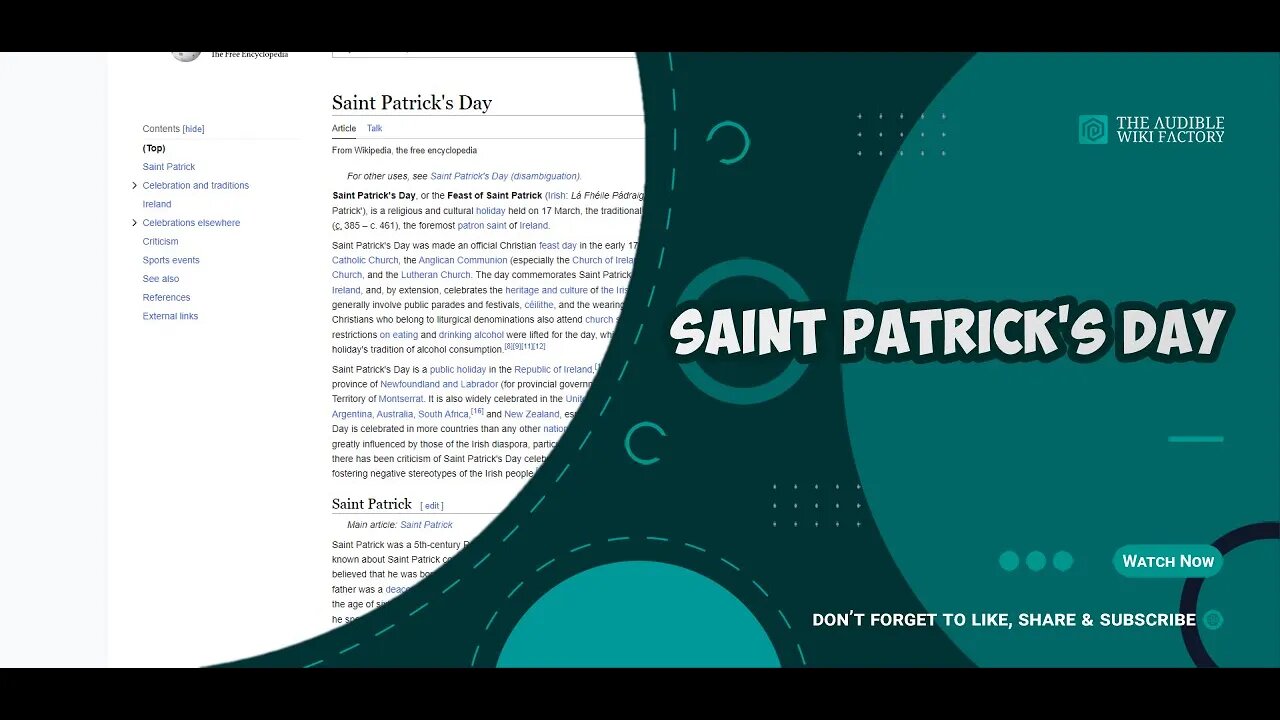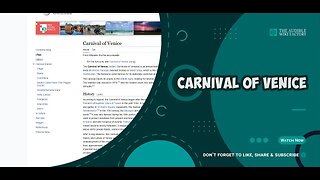Premium Only Content

Saint Patrick's Day, or the Feast of Saint Patrick, is a religious and cultural holiday held on
Saint Patrick's Day, or the Feast of Saint Patrick, is a religious and cultural holiday held on 17 March, the traditional death date of Saint Patrick (c. 385 – c. 461), the foremost patron saint of Ireland.
Saint Patrick's Day was made an official Christian feast day in the early 17th century and is observed by the Catholic Church, the Anglican Communion (especially the Church of Ireland), the Eastern Orthodox Church, and the Lutheran Church. The day commemorates Saint Patrick and the arrival of Christianity in Ireland, and, by extension, celebrates the heritage and culture of the Irish in general. Celebrations generally involve public parades and festivals, céilithe, and the wearing of green attire or shamrocks. Christians who belong to liturgical denominations also attend church services and historically the Lenten restrictions on eating and drinking alcohol were lifted for the day, which has encouraged and propagated the holiday's tradition of alcohol consumption.
Saint Patrick's Day is a public holiday in the Republic of Ireland, Northern Ireland, the Canadian province of Newfoundland and Labrador (for provincial government employees), and the British Overseas Territory of Montserrat. It is also widely celebrated in the United Kingdom, Canada, United States, Argentina, Australia, South Africa, and New Zealand, especially amongst Irish diaspora. Saint Patrick's Day is celebrated in more countries than any other national festival. Modern celebrations have been greatly influenced by those of the Irish diaspora, particularly those that developed in North America. However, there has been criticism of Saint Patrick's Day celebrations for having become too commercialised and for fostering negative stereotypes of the Irish people.
SAINT PATRICK
Saint Patrick was a 5th-century Romano-British Christian missionary and Bishop in Ireland. Much of what is known about Saint Patrick comes from the Declaration, which was allegedly written by Patrick himself. It is believed that he was born in Roman Britain in the fourth century, into a wealthy Romano-British family. His father was a deacon and his grandfather was a priest in the Christian church. According to the Declaration, at the age of sixteen, he was kidnapped by Irish raiders and taken as a slave to Gaelic Ireland. It says that he spent six years there working as a shepherd and that during this time he found God. The Declaration says that God told Patrick to flee to the coast, where a ship would be waiting to take him home. After making his way home, Patrick went on to become a priest.
According to tradition, Patrick returned to Ireland to convert the pagan Irish to Christianity. The Declaration says that he spent many years evangelising in the northern half of Ireland and converted thousands.
Patrick's efforts were eventually turned into an allegory in which he drove "snakes", heathen practices, out of Ireland, despite the fact that actual snakes were not known to inhabit the region.
Tradition holds that he died on 17 March and was buried at Downpatrick. Over the following centuries, many legends grew up around Patrick and he became Ireland's foremost saint.
CELEBRATION AND TRADITIONS
Today's Saint Patrick's Day celebrations have been greatly influenced by those that developed among the Irish diaspora, especially in North America. Until the late 20th century, Saint Patrick's Day was often a bigger celebration among the diaspora than it was in Ireland.
Celebrations generally involve public parades and festivals, Irish traditional music sessions (céilithe), and the wearing of green attire or shamrocks. There are also formal gatherings such as banquets and dances, although these were more common in the past. Saint Patrick's Day parades began in North America in the 18th century...
LINK TO ARTICLE: http://en.wikipedia.org/wiki/Saint_Patrick's_Day
TAGS: Saint Patrick's Day, Patronal festivals in Ireland, British flag flying days, Anglican saints, Spring (season) events in the Republic of Ireland, Public holidays in the United States, Saints days, Public holidays in the Republic of Ireland, Public holidays in Mexico, Public holidays in Canada, Parades, Observances in Australia, National days, March observances, Irish-New Zealand culture, Irish-Canadian culture, Irish-Australian culture, Irish-American culture, Irish folklore, Irish culture, Festivals in Ireland, Catholic Church in the United States, Catholic holy days, 1903 establishments in Ireland, 1783 establishments in Ireland, Saint Patrick, Saint Patrick's Day
#GeneralKnowledge #AudibleWikiFactory #Audible #Wikipedia #SaintPatrick'sDay
-
 13:12
13:12
The Audible Wiki Factory
1 year agoThe Carnival of Venice is an annual festival held in Venice, Italy. The carnival ends on Shrove
482 -
 2:17:52
2:17:52
Red Pill News
12 hours ago $42.66 earnedOn the Battlefield of Truth with Bianca de la Garza on Sat Night Livestream
47.7K2 -
 3:38:35
3:38:35
Fresh and Fit
7 hours agoCatching Homewreckers with Vitaly & Bradley Martyn
51.6K3 -
 15:31
15:31
Tundra Tactical
9 hours ago $22.08 earnedThe Worlds Okayest Firearms Live Stream
41.1K10 -
 LIVE
LIVE
Right Side Broadcasting Network
3 days agoLIVE REPLAY: President Trump Holds a Rally in Greensboro, NC - 11/2/24
4,478 watching -
 11:30
11:30
Space Ice
15 hours agoMovie Blade: Trinity - Wesley Snipes Was The First Superhero - Best Movie Ever
54.6K19 -
 13:05
13:05
Silver Dragons
9 hours agoSilver Dealer on How to Protect Your Wealth BEFORE IT'S TOO LATE
50.9K13 -
 5:12
5:12
Adam Does Movies
9 hours ago $16.00 earnedCanary Black Movie Review - It's Canary Crap!
50.9K12 -
 13:22
13:22
Clownfish TV
7 hours agoBoeing Ends DEI Program and FIRES Their Diversity Boss?!
46.2K30 -
 54:41
54:41
Patriots With Grit
9 hours agoHow To Restore Liberty - You're The Plan | Lt. Col. (Ret). Darin Gaub
57.2K7